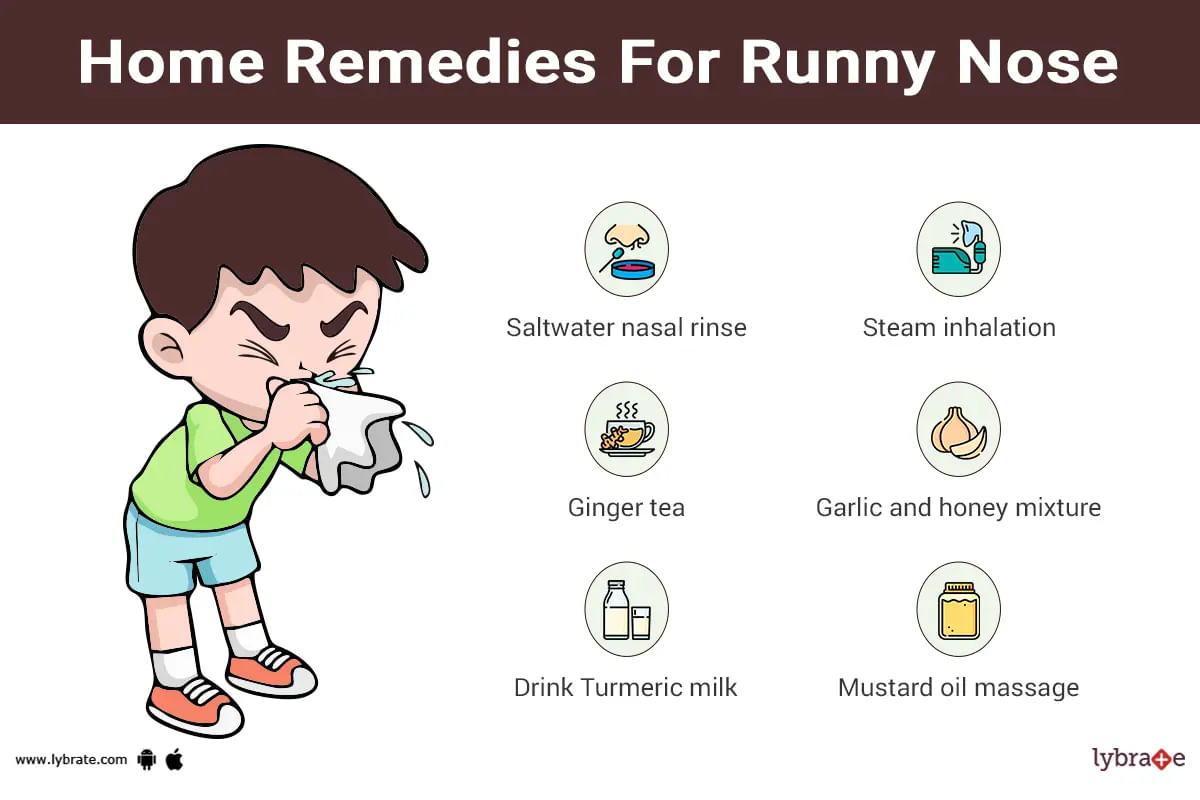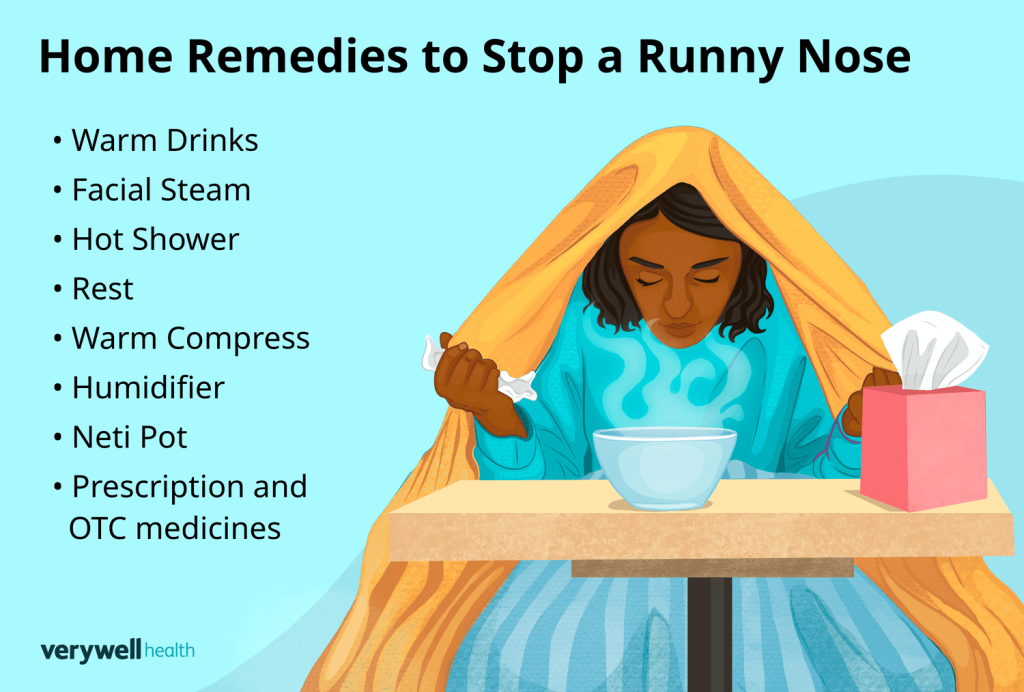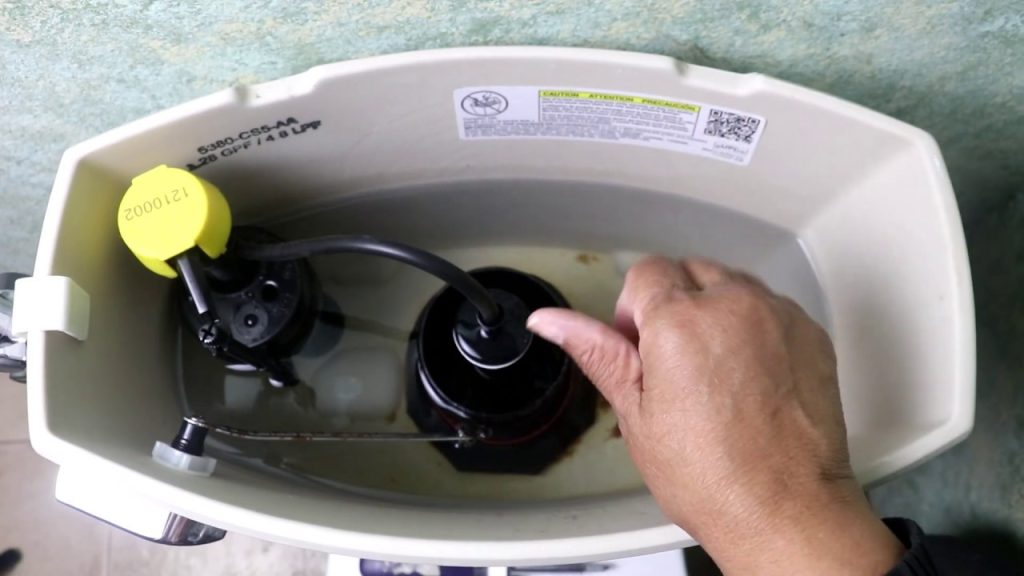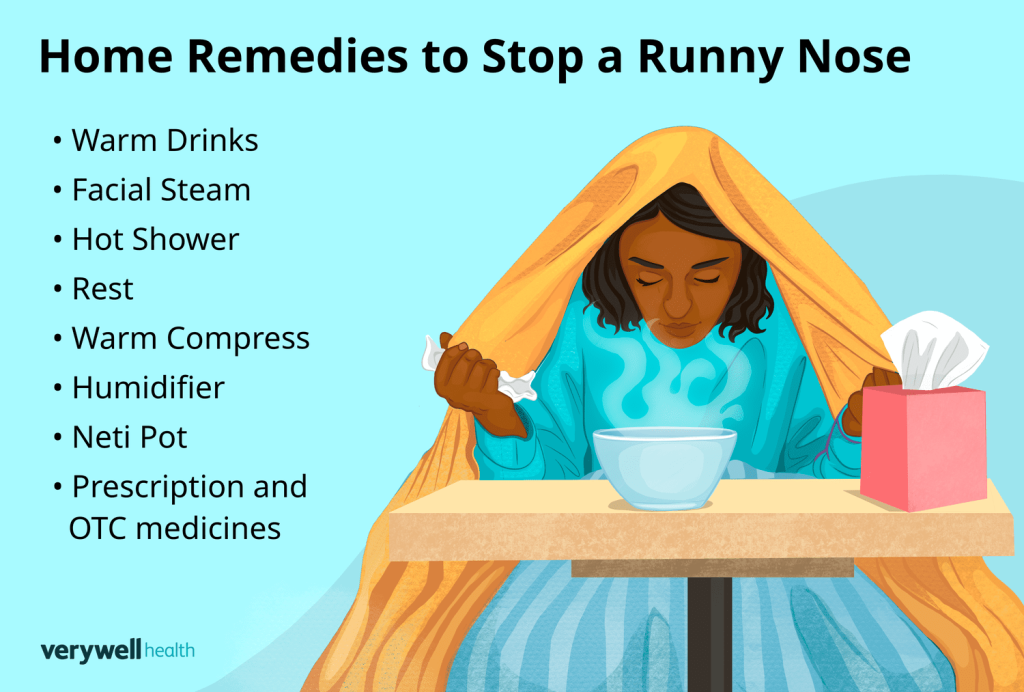Stopping a runny nose can be challenging. It disrupts daily activities and causes discomfort.
A runny nose happens when excess mucus builds up in the nasal passages. This can be due to many reasons, such as allergies, colds, or even weather changes. Many people find themselves constantly reaching for tissues, but there are effective ways to manage this issue.
Understanding the root causes and adopting some practical solutions can bring relief. In this guide, we will explore various methods to stop your nose from running. Whether it’s through simple home remedies, lifestyle changes, or over-the-counter solutions, we’ll cover it all. Get ready to breathe easier and say goodbye to that runny nose!
Causes Of A Runny Nose
A runny nose can be annoying and disruptive. Understanding its causes is the first step to stopping it. Various factors can trigger a runny nose. Let’s explore some common triggers and how allergies and infections play a role.
Common Triggers
Several things can make your nose run. Cold weather is a frequent trigger. Breathing in cold air can irritate nasal passages. This leads to a runny nose.
Dry indoor air can also cause your nose to run. It dries out the nasal lining. The body produces more mucus to keep it moist. This is why your nose runs inside heated buildings.
Spicy foods can cause a runny nose too. They contain chemicals that stimulate the nasal passages. This increases mucus production.
Allergies And Infections
Allergies are a major cause of a runny nose. Common allergens include:
- Pollen
- Dust mites
- Pet dander
When exposed to these allergens, the body releases histamines. This results in a runny nose.
Infections like the common cold and sinusitis also cause a runny nose. Viruses and bacteria irritate the nasal lining. The body responds by producing more mucus.
Understanding these triggers helps in managing a runny nose. Knowing the cause is crucial for effective treatment.
Hydration Importance
Hydration plays a crucial role in stopping a runny nose. Keeping your body well-hydrated helps thin mucus, making it easier to expel. Proper hydration can alleviate discomfort and reduce nasal congestion.
Drinking Water
Drinking water is essential for maintaining hydration. Water helps thin mucus, which can ease nasal congestion. Aim to drink at least eight glasses of water daily. This simple habit can make a significant difference in managing a runny nose.
Warm Beverages
Warm beverages provide comfort and help with hydration. Drinking warm tea or broth can soothe the throat and reduce mucus. Herbal teas, like chamomile or peppermint, are especially effective. They offer calming effects and help clear nasal passages.
Steam Inhalation
Steam inhalation is a simple yet effective remedy to stop a runny nose. It involves breathing in steam from hot water. This method can provide quick relief and help clear nasal congestion.
Benefits Of Steam
Steam inhalation helps open up nasal passages. The warm moisture soothes irritated tissues. It also thins mucus, making it easier to expel. These benefits can provide much-needed relief from a runny nose.
How To Inhale Steam
First, boil water in a pot. Remove the pot from heat. Place it on a stable surface. Lean over the pot, keeping a safe distance. Cover your head with a towel to trap the steam. Breathe deeply through your nose for 5-10 minutes. Repeat this process 2-3 times daily for best results.

Credit: www.cedars-sinai.org
Saline Nasal Spray
Dealing with a runny nose can be quite annoying. One effective remedy is using a saline nasal spray. This simple solution helps to clear your nasal passages. It can provide relief from congestion and runny noses.
Why Use Saline
A saline nasal spray is a mix of salt and water. It helps moisten nasal passages. This can clear out mucus and irritants. Here are some benefits:
- Relieves nasal congestion
- Clears out allergens
- Reduces nasal dryness
Saline is safe for daily use. It does not contain medication. This makes it suitable for children and adults.
Making Your Own Spray
You can make a saline nasal spray at home. Follow these simple steps:
- Boil one cup of water. Let it cool.
- Add one teaspoon of salt.
- Mix until the salt dissolves.
- Pour the solution into a clean spray bottle.
Use your homemade spray as needed. Ensure the bottle is clean. This prevents contamination.
Note: Always use clean, boiled water. This ensures the solution is safe to use.
Honey And Lemon
Experiencing a runny nose can be annoying and disruptive. A natural remedy that can help soothe your symptoms is the combination of honey and lemon. Both ingredients are known for their healing properties and can provide relief from nasal congestion.
Soothing Properties
Honey has antibacterial and anti-inflammatory properties. It helps to coat the throat and reduce irritation. Lemon is rich in vitamin C, which boosts the immune system. The acidity in lemon also helps to break down mucus, making it easier to expel. Together, honey and lemon can provide a soothing effect and help clear a runny nose.
How To Prepare
To prepare this remedy, you will need one tablespoon of honey and the juice of half a lemon. Mix the honey and lemon juice in a cup of warm water. Stir well until the honey is fully dissolved. Drink this mixture slowly, allowing it to soothe your throat and nasal passages.
For best results, consume this honey and lemon drink twice a day. It can help keep your symptoms at bay. Remember to use fresh lemon juice and pure honey for maximum benefits. This simple yet effective remedy can be a great addition to your home treatment options.

Credit: www.lybrate.com
Ginger Tea
Ginger tea is a popular remedy for stopping a runny nose. It has natural properties that can provide relief. This warm, soothing drink is easy to make and has several health benefits.
Health Benefits
Ginger tea helps reduce inflammation in the body. It has anti-inflammatory properties that ease nasal congestion. This makes it easier to breathe.
Ginger contains antioxidants. These antioxidants boost the immune system. A stronger immune system helps fight off infections. This can reduce the frequency of a runny nose.
Ginger also has antiviral and antibacterial properties. These properties help combat the common cold. Drinking ginger tea can speed up recovery.
Ginger tea promotes sweating. Sweating helps eliminate toxins from the body. This can help reduce the symptoms of a runny nose.
Preparation Method
Making ginger tea is simple. First, gather fresh ginger root, water, and honey.
Start by peeling the ginger root. Use a spoon to scrape off the skin. Then, slice the ginger thinly.
Boil two cups of water in a pot. Add the ginger slices to the boiling water. Let it simmer for 10 minutes.
Remove the pot from heat. Strain the tea to remove the ginger slices.
Pour the tea into a cup. Add a teaspoon of honey for sweetness. Stir well and enjoy your ginger tea.
Essential Oils
Essential oils can be a natural remedy for a runny nose. They are derived from plants and have therapeutic properties. Using essential oils can help reduce nasal congestion and soothe irritation. Let’s explore some effective types of oils and how to apply them.
Types Of Oils
Peppermint oil is known for its cooling effect. It can help open nasal passages and ease breathing. Eucalyptus oil has anti-inflammatory properties. It can reduce mucus production and clear airways. Lavender oil is soothing and can relieve nasal irritation.
Tea tree oil has antimicrobial properties. It can help fight infections causing a runny nose. Lemon oil is refreshing and can support immune function. It also helps in reducing nasal congestion.
Application Methods
One simple method is inhalation. Add a few drops of essential oil to a bowl of hot water. Place your face over the bowl and cover your head with a towel. Inhale the steam for 10 minutes. This can help clear nasal passages.
Another method is using a diffuser. Add essential oils to a diffuser and let it run in your room. This can provide continuous relief throughout the day. You can also mix essential oils with a carrier oil. Apply the mixture to your chest and under your nose. This can provide soothing effects and help you breathe easier.
Essential oils can also be added to a warm bath. Add a few drops to your bathwater and soak for 15 minutes. This can help relieve nasal congestion and provide relaxation.
Diet And Nutrition
Diet and nutrition play a crucial role in managing a runny nose. What you eat can either ease or worsen your symptoms. By choosing the right foods, you can support your immune system and reduce inflammation. Let’s explore some dietary tips to help you stop your nose from running.
Foods To Avoid
Certain foods can trigger or worsen a runny nose. Dairy products are common culprits. Milk, cheese, and yogurt can increase mucus production. Spicy foods may also irritate your nasal passages. This can lead to more mucus. Avoiding these foods can help keep your nose clear.
Sugary foods and drinks can weaken your immune system. They can make it harder for your body to fight off infections. Processed foods often contain high levels of sugar and unhealthy fats. These can contribute to inflammation and congestion.
Immune-boosting Foods
Eating foods rich in vitamins and minerals can support your immune system. Citrus fruits like oranges and lemons are high in vitamin C. This vitamin helps reduce cold symptoms and speeds up recovery.
Garlic and ginger have natural anti-inflammatory properties. They can help reduce nasal congestion. Add them to soups and meals for an extra boost.
Leafy greens like spinach and kale are packed with nutrients. They provide vitamins A, C, and E, which are essential for immune health. Incorporate these vegetables into your diet to help stop your nose from running.

Credit: www.pharmacy24.ca
Frequently Asked Questions
What Causes A Runny Nose?
A runny nose is often caused by colds, allergies, or infections. It occurs when nasal tissues and blood vessels produce excess fluid.
How Can I Stop My Nose From Running?
To stop a runny nose, stay hydrated, use saline sprays, and take antihistamines. Rest and avoid irritants.
Are There Home Remedies For A Runny Nose?
Yes, home remedies include steam inhalation, staying hydrated, and using saline nasal sprays. Avoid allergens and irritants.
Can Diet Affect A Runny Nose?
Yes, spicy foods can temporarily worsen a runny nose. Hydrating foods like soups and teas can help soothe it.
Conclusion
Stopping a runny nose can be simple with the right steps. Keep hydrated. Use a humidifier. Try saline sprays for relief. Rest well to boost your immunity. Avoid irritants like smoke and strong odors. Eat a balanced diet to support your health.
Consider over-the-counter medications if needed. Always consult a doctor if symptoms persist. These tips can help you manage a runny nose effectively. Stay well and breathe easy!



